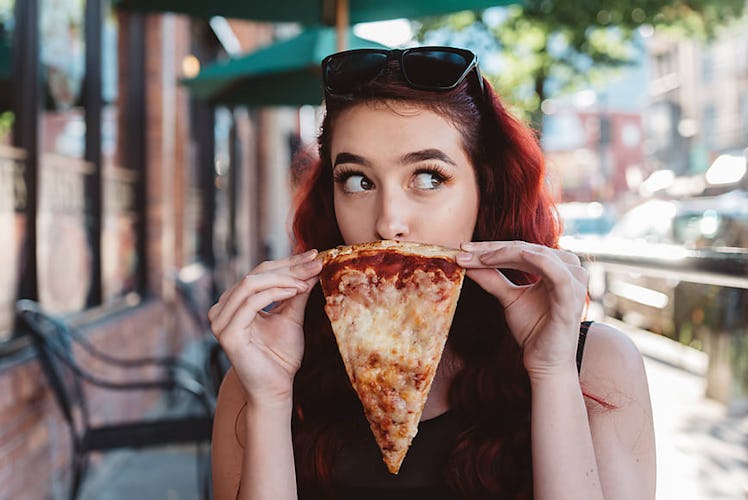
An Expert Reveals 5 Subtle Signs That Mean You're Probably Not Eating Enough Protein
Whenever I eat a high-protein meal, I feel like I'm channeling my inner Dwayne "The Rock" Johnson, and I'll soon be able to take on the entire world while being a doting father to my tiny infant daughters. Seriously though, as someone who doesn't eat meat, I have to be a little more vigilant when watching for signs that mean I need more protein than, say, your average bacon-lover. Although it's totally possible to eat a well-rounded plant-based diet, whether you're on team tofu or team cheeseburger, it's important to understand just how much of the macronutrient you should be eating each day.
Since everyone's bodies are shaped a little differently, there's not really a magic number for the amount of protein you "should" be eating every day. Instead, according to Lyuda Bouzinova, an ACE-certified fitness nutrition specialist, personal trainer, and co-founder of Mission Lean, you can calculate a healthy target to fit your specific needs by using a simple formula. "The official recommendation is that you need .36 grams of protein for every pound of bodyweight," she tells Elite Daily over email.
So what exactly is protein anyway, and why is it so important to eat enough of it? "Protein is an important macronutrient that absolutely needs to be part of a balanced diet," Bouzinova says. But not just any old source of protein will be great for your health, she adds. Be wary of high-protein and low-nutrition foods like protein bars, the expert warns. "You should focus on attaining it from natural, single-ingredient food sources like fish or oats. You do not need to overdo it on any macronutrient, including protein."
But if overdoing it on the protein is the opposite of what you're dealing with, here are some signs to watch out for that mean you need a little more of the nutrient in your diet.
Your Hair Is Less Fab Than Usual
If your once-luscious locks start feeling sparser and sparser, you might want to double-check how much protein you're getting in on the daily. According to the American Academy of Dermatology (AAD), if your protein intake is lower than it should be, you could start to notice your hair thinning.
Basically, the AAD explains, when your body's not getting enough protein, it can start to ration the nutrient by shutting down hair growth. However, the organization says this usually doesn't happen until "about two or three months after a person does not eat enough protein."
Your Immune System Is Lagging
“Protein is needed to build the components of our immune system,” Alissa Rumsey, M.S., R.D., a spokesperson for the Academy of Nutrition and Dietetics, told SELF. “If you are under-eating protein, over time your immune system may weaken.”
Another possible issue to consider, Bouzinova points out, might be the fact that you aren't eating enough food in general. If you're noticing signs of malnutrition like weakness and poor concentration, Bouzinova tells Elite Daily, be sure to double-check both your protein intake and your overall food intake.
The Gym Isn't Paying Off
Working out is something I usually do for the benefits it brings to my mental health, but occasionally, I also want to help my body get strong, Michelle Obama-style. Sometimes, though, despite pushing myself as hard as I can at the gym, I can't seem to find the spectacular new muscles that I thought my sweat sessions had earned.
If you're working out but don't seem to be gaining muscle, you might not be getting enough protein, according to the results of a study published in The Journal of Physiology. Be sure to stick to unprocessed, natural, post-workout protein sources to rebuild your muscles, Bouzinova recommends, such as fish, almonds, eggs, and oats.
You're Salty AF (And No, I Don't Mean Moody)
If you've always loved salty treats, I can absolutely relate. But if you're more of a sweets person and have suddenly started longing for the saltiest, cheesiest chips you can find at the grocery store, you might need to look at how much protein you're eating. A study published in the American Journal of Clinical Nutrition found that if you aren't getting enough protein, your body can start to crave salty foods, which tend to be protein-rich.
You're Uncomfortably Bloated
The discomfort that comes from having a bloated stomach isn't always due to having overeaten something. Instead, says Bouzinova, it could be a sign that you aren't getting enough protein. Swap your bread-filled breakfast for something like eggs or a tofu scramble, and your stomach should be soothed in no time.